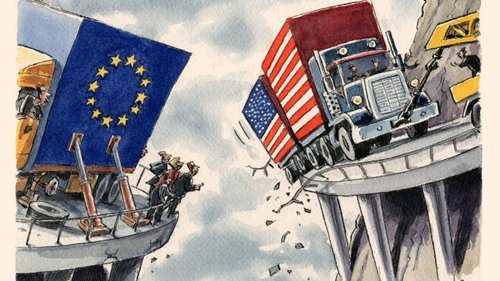
By Nie Shuyi
US Secretary of State Mike Pompeo said in a recent interview that countries around the world will realize that they are determined to be partners and allies of the US. However, probably not many countries will accept Pompeo's boasting.
Over the past three years, the US and Europe have repeatedly staged scenes of unilateralism versus multilateralism. For European countries, the Trump administration which believes in "America first", has continuously abandoned its international responsibilities and frequently "withdrew" from international organizations, especially the Paris Agreement and the Iran nuclear deal, seriously damaging Europe's political interests and diplomatic image. The US provoked a trade war with Europe and abused "long-arm jurisdiction" to disrupt the normal economic and trade exchanges between European countries and other countries, which has harmed Europe's economic interests. The US has been heaping pressure on its European NATO allies to increase military spending, withdrawn forces in hotspots such as the Middle East regardless of the opinions of its European allies. This has increased Europe's security risks and threatened Europe's security interests.
The US not only refused to participate in global cooperation, but also frequently block Europe especially during the pandemic. The US snatched European masks at the peak of the pandemic in Europe. Andreas Geisel, Germany’s Berlin Senator of the Interior, said the diversion of masks amounted to an "act of modern piracy". The US intended to spend a lot of money to purchase patent rights for scientific research results of German vaccine companies, which is fiercely opposed by Germany. At the beginning of the outbreak, Europe had hoped that the US would take the lead in vaccine research and rally countries in fighting the pandemic. However, the Trump administration failed to take the leadership in the fight against the pandemic, and instead, the US "cutting off the supply" of the WHO and other practices have destroyed the multilateral mechanism that the world relies on to alleviate the pandemic. All these have left European countries frustrated.
In addition, the US has continuously stirred up conflicts between the old and new Europe and undermined European unity out of its own geopolitical interests, which has also made European countries resentful. In the past three years, the US has continuously roped in Central and Eastern European countries that have security needs from the US. On the one hand, it has continuously suppressed more independent Western European countries such as France and Germany. Although US Secretary of State Mike Pompeo has visited Europe many times recently, his main destinations are Central and Eastern Europe, Southern Europe, and Nordic countries. He "perfectly" bypassed major Western European countries such as Germany and France.
It can be said that Pompeo's recent visits to Europe reflect the strategic intention of the US to split Europe. The US announced the withdrawal of troops from Germany and sending more troops to Poland so it can further bind Poland on security issues while "punishing" Germany. It has also continued to increase the sanctions against the "Nord Stream No. 2" natural gas pipeline project, undermined the energy cooperation between Europe, especially Germany, France and other countries with Russia. On the other hand, the US has tried to win Balkan countries over for energy cooperation. The US proposed the so-called "Three Seas Initiative", also known as the Baltic, Adriatic, Black Sea (BABS) Initiative, to tip the balance of power in Europe and reshape European geopolitics.
In the past few years, fierce games and conflicts between the old and new Europe have continued on the issues such as refugees, energy, environmental protection, and economy. This is not only the result of the unbalanced development of the old and new Europe, but also the result of the instigations by the US. Before Germany took over the EU presidency in July this year, German Chancellor Angela Merkel publicly stated that one of the most important issues for Europe at present is to maintain unity.
The US, which has made big strides along the road of unilateralism, will only drift apart from Europe, which has been continuously improving its strategic autonomy.













